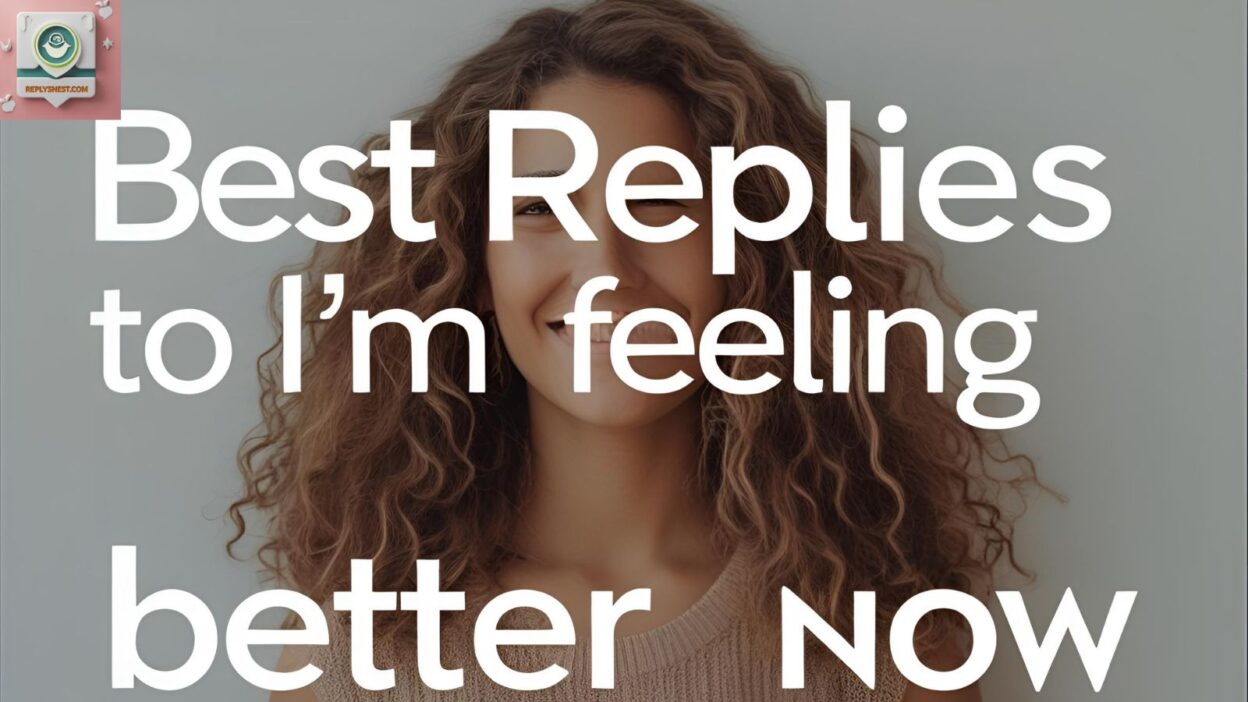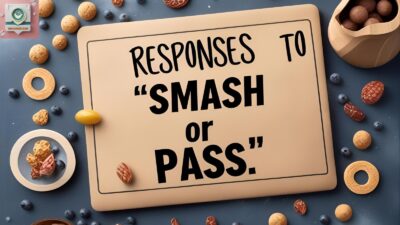When someone tells me they’re feeling better, I see it as more than just good news it’s a shared moment of healing, hope, and happiness. It’s a chance to acknowledge their progress, offer support, and perhaps even bring a touch of humor or comfort into the moment. Whether it’s a colleague, friend, or family member, replying with genuine warmth can make all the difference. Best Replies to “I’m Feeling Better Now”.
I usually start with something uplifting like “That’s awesome!” or “I’m so glad to hear that!” simple but filled with positivity. These phrases don’t just sound nice; they reflect your care and emotional connection. Sometimes, I might ask, “What’s been helping?” to show I’m engaged and open to deeper conversations. These little replies can become part of a bigger chapter of someone’s journey to wellness.
Think of it as a tiny carnival of words, a mini celebration that reflects their improvement. You can even draw inspiration from your shared interactions, using thoughtful, tailored replies that feel personal. In my experience, even a few sweet, encouraging words delivered at the right pace can restore someone’s emotional strength and remind them they’re not alone in the chaos.
And if you’re feeling bold, throw in a little mischief or tomfoolery; a playful twist like “That’s fantastic did you eat your marshmallows today?” often lands well, especially when the mood calls for something more lightness than solemnity.
1. “That’s such a relief to hear!”
When someone’s better, it’s a shared weight off.
Best use: When a friend or loved one has been unwell or down for a while.
Not to use: If the person only had a minor inconvenience they might find it exaggerated.
Other ways to say it:
- “Thank goodness!”
- “So glad to hear that!”
Example:
Them: “I’m feeling better now.”
You: “That’s such a relief to hear! I’ve been thinking about you a lot.”
Read More: Funny Ways to Say “It’s Cold”
2. “I’m really glad to hear that.”
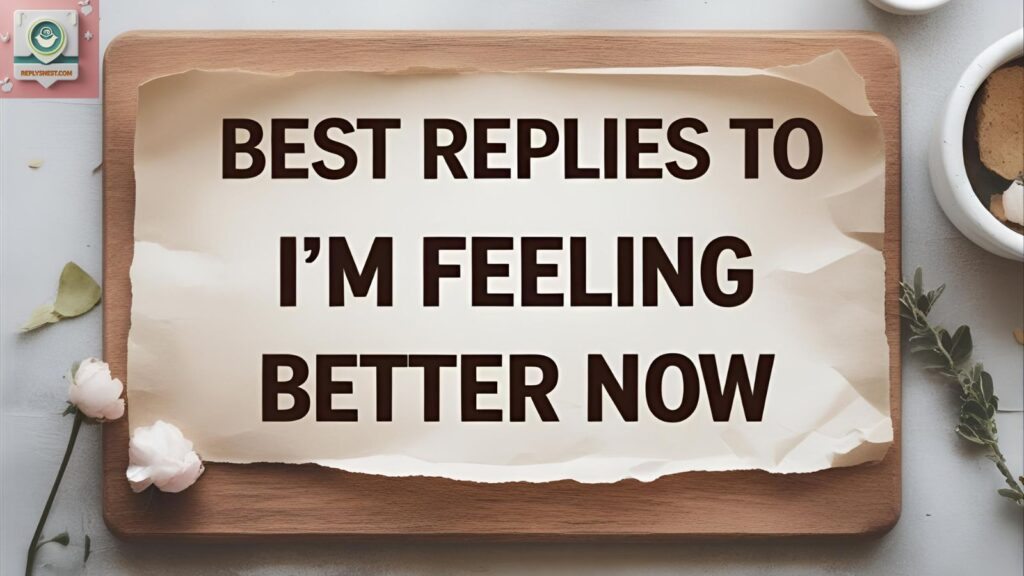
Classic, calm, and sincere.
Best use: Works in almost every context professional or personal.
Not to use: If you want to sound more enthusiastic or celebratory.
Other ways to say it:
- “Good news!”
- “You don’t know how happy that makes me.”
Example:
Them: “Feeling better now.”
You: “I’m really glad to hear that. You’ve been through a lot.”
3. “That makes my day!”
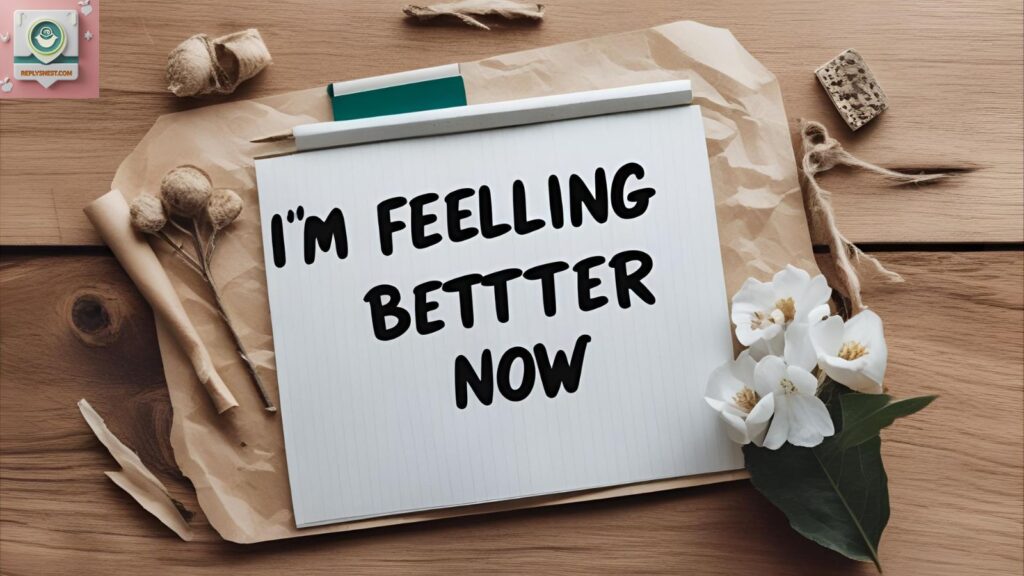
Celebrate their betterment like a victory.
Best use: When you’ve been closely concerned or emotionally invested.
Not to use: If you’re trying to maintain a professional tone.
Other ways to say it:
- “Best news I’ve heard all day.”
- “Whew! That’s wonderful.”
Example:
Them: “Hey, I’m feeling better now.”
You: “Ahh, that makes my day! I’ve been rooting for you.”
4. “I was hoping you’d say that.”
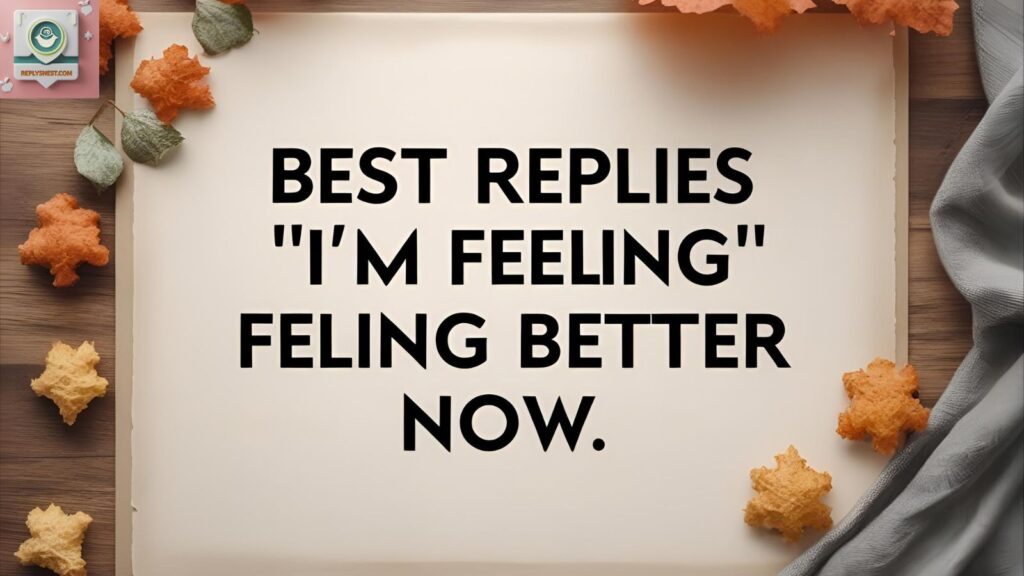
Subtle, sweet, and shows genuine care.
Best use: With someone you have a strong bond or shared concern with.
Not to use: In formal or professional contexts.
Other ways to say it:
- “I had a feeling you were turning a corner.”
- “Been waiting to hear those words.”
Example:
Them: “I’m feeling better now.”
You: “I was hoping you’d say that. You deserve to feel good again.”
5. “Proud of you for getting through it.”
When healing wasn’t easy.
Best use: After someone faced emotional or mental health challenges.
Not to use: If the person downplays their struggle.
Other ways to say it:
- “You’ve handled this like a champ.”
- “You should be proud of yourself.”
Example:
Them: “Feeling better now.”
You: “Proud of you for getting through it. That couldn’t have been easy.”
6. “What helped the most?”
Turn their good news into a deeper conversation.
Best use: When you’re genuinely curious about their recovery process.
Not to use: If the person isn’t a talker or doesn’t want to revisit.
Other ways to say it:
- “Was there a turning point for you?”
- “Anything you’d recommend to others?”
Example:
Them: “Feeling better now.”
You: “That’s great! What helped the most, you think?”
7. “I’ve been keeping you in my thoughts.”
Let them know they weren’t alone.
Best use: After a period of silence or distance.
Not to use: If you haven’t actually thought about them (honesty matters).
Other ways to say it:
- “I’ve been quietly cheering you on.”
- “I’ve had you in my prayers.”
Example:
Them: “I’m feeling better now.”
You: “I’ve been keeping you in my thoughts. So glad to hear this.”
8. “You look/sound so much better!”
Mirror what you see they’ll feel it too.
Best use: During in-person or video calls.
Not to use: If it’s only text they won’t get the full warmth.
Other ways to say it:
- “You’ve got that spark back!”
- “You look more like yourself today.”
Example:
Them: “Feeling better now.”
You: “I can tell! You sound like your old self again.”
9. “I bet that feels good.”
Empathetic and validating.
Best use: When you want to celebrate the emotional payoff of recovery.
Not to use: If it might sound dismissive tone matters.
Other ways to say it:
- “That must be such a relief.”
- “Finally, right?”
Example:
Them: “Feeling better now.”
You: “I bet that feels good. You’ve earned it.”
10. “Let’s make up for lost time.”
Invite joy back into their life.
Best use: For close friends or partners.
Not to use: If their energy or stamina isn’t fully back yet.
Other ways to say it:
- “Let’s catch up soon.”
- “Now we can plan that thing!”
Example:
Them: “Feeling better now.”
You: “Then it’s time we do something fun!”
11. “Do you need anything else right now?”
Show that support doesn’t stop at ‘better.’
Best use: When someone is in the final stages of recovery.
Not to use: If they’re already overwhelmed with care.
Other ways to say it:
- “Still here if you need anything.”
- “Let me know if anything’s still lingering.”
Example:
Them: “Feeling better now.”
You: “That’s great. Anything else I can help with?”
12. “Welcome back!”
Fun, light, and friendly.
Best use: In group settings or after an absence.
Not to use: If they were gone for something traumatic.
Other ways to say it:
- “Missed you around here.”
- “Glad to have you back in action.”
Example:
Them: “Feeling better now.”
You: “Welcome back! Things weren’t the same without you.”
13. “You’ve been so strong.”
Affirm their resilience.
Best use: Emotional support for long-term battles.
Not to use: If they’re uncomfortable with emotional praise.
Other ways to say it:
- “You’ve handled this so well.”
- “I admire your strength.”
Example:
Them: “I’m feeling better.”
You: “You’ve been so strong through all of this.”
14. “That’s music to my ears.”
Cheerful and lighthearted.
Best use: When you’re genuinely happy and want to uplift.
Not to use: In very serious situations it might feel flippant.
Other ways to say it:
- “That’s what I wanted to hear!”
- “Love hearing that.”
Example:
Them: “I’m feeling better now.”
You: “Ah, music to my ears!”
15. “You look peaceful today.”
Gentle, affirming, and noticed.
Best use: With someone healing emotionally or mentally.
Not to use: With someone who doesn’t like personal comments.
Other ways to say it:
- “You look more at ease today.”
- “There’s a calm about you.”
Example:
Them: “Feeling better now.”
You: “I can see it you look so peaceful.”
16. “Thanks for sharing that with me.”
Validate their openness.
Best use: When they’re not the kind to open up easily.
Not to use: If it feels like you’re brushing past it.
Other ways to say it:
- “I really appreciate you telling me.”
- “That means a lot.”
Example:
Them: “I’m doing better now.”
You: “Thanks for sharing that with me. Truly.”
17. “I was hoping things were turning around.”
Show you’ve been quietly watching their journey.
Best use: After a long struggle.
Not to use: If you’ve been totally out of touch.
Other ways to say it:
- “I had a good feeling.”
- “Been sensing the shift.”
Example:
Them: “I’m feeling better now.”
You: “I was hoping things were turning around. This is good news.”
18. “The worst is behind you.”
Help them look forward.
Best use: When they need encouragement to keep going.
Not to use: If they’re still anxious about relapse.
Other ways to say it:
- “You’ve made it through the rough part.”
- “It’s all uphill from here.”
Example:
Them: “Feeling better now.”
You: “Sounds like the worst is behind you. I’m so glad.”
19. “Mind if I check in on you still?”
Compassionate continuity.
Best use: When you’re not sure how much to stay involved.
Not to use: If you sense they need space.
Other ways to say it:
- “I’ll still keep an eye out, if that’s okay.”
- “Let me know if I should keep checking in.”
Example:
Them: “I’m better now.”
You: “Mind if I check in on you still? Just to be sure.”
20. “That glow says it all.”
A bit poetic and uplifting.
Best use: In personal and casual conversations.
Not to use: In overly formal or stoic settings.
Other ways to say it:
- “You’ve got your spark back.”
- “The light’s back in your eyes.”
Example:
Them: “Feeling better now.”
You: “That glow says it all.”
21. “So happy to hear that.”
A short and sweet joy bomb.
Best use: Great for text messages, casual conversations, or even work chats when someone shares positive recovery.
Not to use: If the context is very emotional or serious and requires a deeper, more heartfelt response.
Other ways to say it:
- “That’s wonderful news!”
- “Yay! That’s great to hear.”
Example:
Them: “Hey, I’m feeling better now.”
You: “So happy to hear that! You’ve been on my mind.”
22. “You’ve made my day.”
A way to reflect their good news back with joy.
Best use: When their improvement genuinely lifts your mood, especially after worry or concern.
Not to use: In professional settings it can sound overly sentimental.
Other ways to say it:
- “That just made me smile.”
- “I needed some good news today thank you!”
Example:
Them: “Feeling better now.”
You: “You’ve made my day! So glad things are looking up.”
23. “Thank goodness you’re on the mend.”
A mix of relief and genuine concern.
Best use: When someone has been sick, struggling, or in recovery for a while.
Not to use: If it’s a very minor issue (like a 2-hour headache).
Other ways to say it:
- “Glad you’re bouncing back.”
- “Finally, some good news!”
Example:
Them: “I’m feeling better now.”
You: “Thank goodness you’re on the mend. That’s been weighing on my heart.”
24. “Knew you’d bounce back.”
Faith-filled and encouraging.
Best use: When someone has a history of resilience and you want to affirm it.
Not to use: If they’re feeling vulnerable or unsure it might feel dismissive.
Other ways to say it:
- “You’re a tough one, I had no doubt.”
- “You always pull through.”
Example:
Them: “Feeling better now.”
You: “Knew you’d bounce back. You’re stronger than you think.”
25. “You’ve got that fight in you. Proud of you.”
Uplifting and strong, with a hint of admiration.
Best use: For someone who’s been battling something tough physically, mentally, or emotionally.
Not to use: In a super casual or humorous setting it carries emotional weight.
Other ways to say it:
- “You didn’t let it win. Respect.”
- “You’ve shown serious strength.”
Example:
Them: “I’m feeling better now.”
You: “You’ve got that fight in you. Proud of you for making it through.”
Conclusion
In life, healing doesn’t always come in grand moments it often comes in quiet texts, gentle updates, and those five-word check-ins like “I’m feeling better now.” And when someone shares that with you, it’s more than just an update. It’s an invitation to connect, to support, and to celebrate their progress.
Having spent years in personal conversations, emotional support circles, and communication coaching, I’ve come to realize: the most powerful replies are often the most human ones. It’s not about being perfect with your words. It’s about being present, warm, and real.
